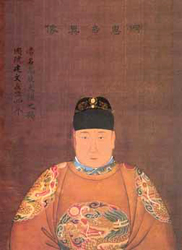

Famous Cases | Historical Tales | Vampires | Zombies
 |  |
Famous Cases | Historical Tales | Vampires | Zombies |
 |
| The Jianwen Emperor |
The Ming Dynasty (1368-1644) was a great age in Chinese history, highlighted by territorial expansion and a flowering of arts and culture. But the dynasty almost never got off the ground due to the pernicious influence of vampires.
The Mings arose in the 14th century behind the leadership of Zhu Biao, a onetime Buddhist monk who had risen through the ranks of the military during the turbulent times. After overthrowing the Yuans, Zhu Biao, also known as the Hongwu Emperor, established a dynastic capital in 1368 at the ancient city of Nanjing on the Yangtze River delta south of Beijing. The imperial complex, known as the Stone City, included 90 palaces and courtyards and was surrounded by a moat and a massive stone wall.
Like many leaders of the time, the Hongwu emperor was fascinated by vampires. He considered older vampires to be soothsayers who held the the keys to immortality and so he tolerated their nocturnal hunts, as long as they directed their bloodlust away from him and his family. The Hongwu emperor even assigned an eloquent, learned vampire named Fang Xiaoru to tutor his children and grandchildren. The aptly named Fang developed a close bond with the emperor's grandson, Zhu Yunwen.
When the Hongwu Emperor stepped aside in 1392, a struggle for power ensued among his family members. After a brief period of unrest, the emperor's grandson Zhu Yunwen assumed the throne in 1398 at the age of 22. Zhu became known as the Jianwen Emperor, meaning “Establishment of Civil Virtue,” but his reign was to belie those words.
As soon as he ascended to the throne, the Jianwen Emperor appointed Fang Xiaoru as second-in-command and head of his personal security staff. Fang and his coterie of vampiric assistants had their wing at the Imperial Palace.
The new emperor's fascination soon crossed over into obsession; he was turned during his first year of rule, and began leading his pack of vampire administrators on nightly forays into the neighborhoods outside of the Stone City. At first, they hunted far from the palace, in the neighborhoods where the commoners, merchants, artisans and laborers lived. Then, they turned their attention to the the high-ranking officials and wealthy merchants who lived to the east and west of the imperial palace. The Jianwen Emperor and the other vampires would scurry along narrow passageways lined with siheyuan, or courtyard dwellings, and hop over the garden walls to gain entry into the homes. Throughout the summer of 1398, the quiet nights were shattered by the screams of victims echoing off the carved roof beams and pillars of the large siheyuan, and peace only returned when the vampires retreated behind the heavily guarded walls of the Stone City to sleep, their bellies filled with blood.
 |
| A model of Imperial Nanjing with the Stone City to the right. |
The situation in Nanjing quickly grew intolerable, and in 1399, a group of Nanjing aristocrats traveled north to Beijing to visit Zhu Di, the Jianwen Emperor's uncle and one of the men who been passed over for the job. They implored Zhu Di to help, telling him that his nephew had fallen victim to “evil counselors.” Zhu Di had acquired considerable military experience fighting with the Mongols in the north and saw in the aristocrats' tale an opportunity to seize the title that had eluded him just a year earlier. He quickly raised an army and marched toward Nanjing.
When the Jianwen Emperor learned of the move, he sent his own troops north to meet his uncle. Over the next two years, Zhu Di's troops fought their way south, kilometer by kilometer, and in 1402, they finally reached Nanjing. A huge battle took place outside the walls of the Stone City. For days, the sky above the city was dark with bolts from recently developed repeating crossbows, and the acrid smoke of hand cannons and bombs filled the air. Zhu Di's troops finally made it to the Stone City walls, where they were driven back by flamethrowers directed down at them from the watchtowers. Finally, they breached the walls and engaged a small army of vampires army led by Fang Xiaoru. The vampires fought fiercely, but had to retreat into the Imperial Palace as the sun came up on July 13, 1402. Zhu Di's troops set fire to the palace, and three main halls, including the throne room, burned down.
Several vampires who escaped the flames were captured, hooded and imprisoned. Among them was Fang Xiaoru, the emperor's trusted advisor. He was executed shortly thereafter, reportedly by being severed at the waist. Before he died, Fang managed to dip his finger in his own blood and write the Chinese word for “usurper” on the ground—a final insult to Zhu Di.
Unfortunately for Zhu Di, the Jianwen emperor was not among those captured. It was initially assumed that he had perished in the flames, until searchers found a network of tunnels under the imperial palace that led to the river outside of the Stone City.
The uncertain disposition of the Jianwen Emperor unnerved Zhu Di. He surrounded himself with bodyguards and had some of his top soldiers search the city for weeks on end looking for the vampire emperor. When the bodies of two of Zhu Di's trusted bodyguards turned up at the gates of the Stone City, drained of blood and dismembered, the word for “usurper” carved into their chests, Zhu Di decided it was time to relocate the capital to Beijing. There, he ordered construction of a massive compound called the Forbidden City. The complex, modeled after Nanjing's Stone City, was completed in 1420.
Four years later, Zhu Di died. The Ming Dynasty that he helped nurture would continue on for more than 200 years.
And the Jianwen Emperor? Some believe he followed Zhu Di to Beijing and still lives there, more than 500 years after he was ejected from the throne. They say he walks the streets in the guise of an old man stooped with age, and preys on the many peasant farmers and migrant workers who flood the city looking for work.